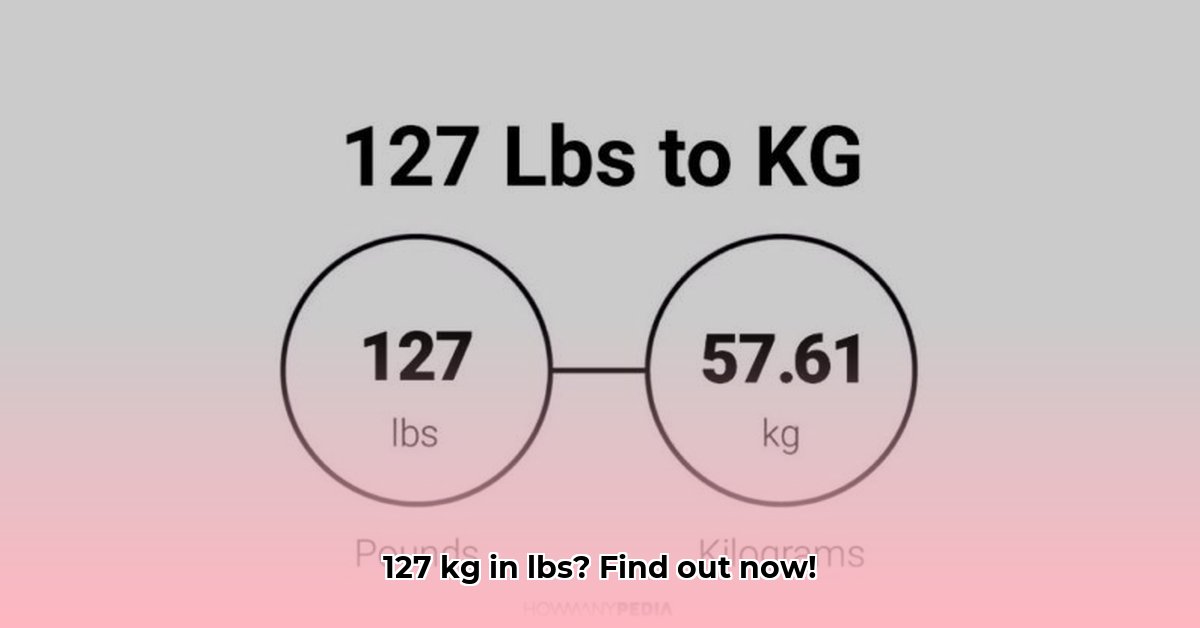Quick Weight Conversion: Kilograms to Pounds
127 kg equals 279.99 lbs (approximately 280 lbs).
Conversion Formula and Calculations
To convert kilograms to pounds, use the following formula:
Pounds = Kilograms * 2.2046226218488
Step-by-Step Example for 127 kg:
- Start with the weight in kilograms: 127 kg
- Multiply by the conversion factor: 127 kg * 2.2046226218488 lbs/kg
- Result: 279.9870729756 lbs
For most everyday purposes, using 2.20462 is sufficient and yields approximately 280 lbs.
Defining Kilograms and Pounds
A kilogram (kg) is the base unit of mass in the International System of Units (SI), the modern metric system. It is roughly equivalent to the mass of one liter of water.
A pound (lb) is a unit of mass used primarily in the United States customary and imperial systems. One pound is defined as exactly 0.45359237 kilograms. Some research suggests the exact definition of a kilogram may be subject to very minor adjustments as measurement science advances.
Quick Conversion Table (Kilograms to Pounds)
| Kilograms (kg) | Pounds (lbs) |
|---|---|
| 120 | 264.55 |
| 125 | 275.58 |
| 127 | 279.99 |
| 130 | 286.60 |
| 135 | 297.62 |
Practical Applications of kg to lbs Conversion
Understanding the relationship between kilograms and pounds is crucial in various real-world scenarios:
- Healthcare: Accurate weight conversions are essential for medication dosage calculations, ensuring patient safety.
- Travel: Converting between kg and lbs helps avoid baggage fee surprises, especially on international flights.
- International Trade: Accurate weight conversions are critical for smooth transactions in global commerce.
- Fitness and Nutrition: Conversions enable individuals to track progress effectively when resources use different units.
- Cooking and Baking: Converting between metric and imperial units ensures culinary success when using international recipes.
Avoiding Common Conversion Errors
While seemingly straightforward, weight conversions can be prone to errors. Here are some common pitfalls to avoid:
- Premature Rounding: Using a shortened conversion factor (e.g., 2.2 instead of 2.20462) can introduce significant errors, especially with larger weights.
- Misplaced Decimals: A simple decimal error can drastically alter the result. Always double-check your inputs and calculations.
- Unit Confusion: Ensure you are multiplying by the correct conversion factor and not the weight itself. Keeping track of units throughout the process is crucial.
- Cumulative Rounding Errors: If a calculation involves multiple steps, round only the final result to minimize error propagation.
- Typos: Double-checking numerical entries helps prevent typos that can significantly impact the outcome.
- Over-Reliance on Online Converters: While convenient, online converters are not infallible. It’s advisable to verify results independently, particularly when precision is paramount.
By understanding the conversion process and avoiding these common mistakes, you can ensure accurate and reliable weight conversions between kilograms and pounds. While ongoing research may refine specific conversion methods, the core principles remain the same. Always prioritize accuracy, double-check your work, and remember the importance of the correct conversion factor. This cautious approach acknowledges the potential for evolving knowledge in metrology while providing reliable guidance based on current best practices.
- Borosilicate Glass Containers Offer Superior Food Storage and Meal Prep - January 20, 2026
- Glass Lid Storage Containers Keep Food Fresh and Safe - January 19, 2026
- Borosilicate Glass Storage Delivers Durability and Safety for Meals - January 18, 2026










